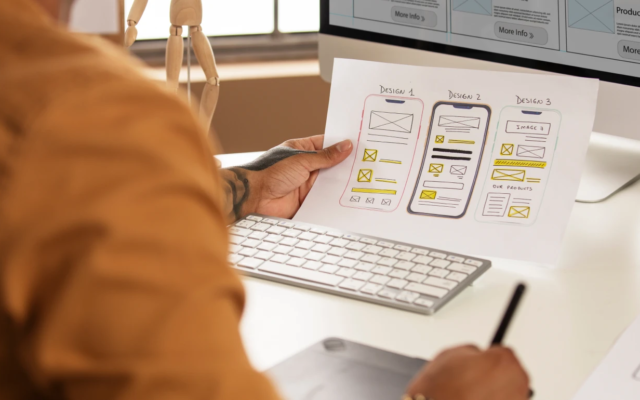The greater choice, the harder it is to choose. What do you do in a grocery store when you need to buy apples and see one kind of apple on the counter? Most probably, you just take them and go to the checkout. And what about the situation when there are several apple varieties to choose from? Likely, it will take you some time to consider all options and choose the needed kind. What’s more, such a situation may even end with you going out of the store with an empty bag.
The same happens in the digital world. The more options are available, the greater responsibility is put on your shoulders. Especially when it comes to costly and life-changing decisions. And choosing a software development company whose vision of the future of retail is the same as yours can exactly be the one.
You are here today to get a bit of advice on how to choose a software development partner. We’ll help you dispel your main fears of building ecommerce websites. Also, we will discuss a few common worries that chase people on their way to outsourcing and turning their idea into a business.
Find an eCommerce Website Development Partner in 5 Steps
Your ecommerce website costs depend on how effectively your team manages time, resources, and budget. We compiled the list of the 5 most important steps to go through to find a reliable ecommerce development partner.
1. Turn into a researcher: google and review
All roads lead to Rome. This was true some time ago. Now, all roads lead to Google… or some other search engines, as you wish. Yes, start with search engines. Google software development companies and outsourcing partners. Check their websites. Create bookmarks for the vendors that offer services for ecommerce businesses. Usually, what you should look for is building software as a service solutions.
Once you made the list of candidates, review their websites more attentively. A website is like a face of a business. It should be attractive, responsive, and intuitive. If you experience usability problems on a website — it’s a good reason to exclude the vendor from your list. Indeed, how can a company provide a quality service if their own website doesn’t meet the basic user needs?
Next, pay attention to the ecommerce website design. UI/UX design can give you a better understanding of what beauty is in the eyes of the vendor. Get the first impression from the home page of websites. Try to figure out the mission and values of the chosen companies. Check their social media pages; the links to them are usually presented in the contacts section. After studying all the mentioned, narrow your list to 3-5 candidates that successfully stood the test of your gut feeling.
PRO TIP: Do not focus on loud names. Instead, search for a small or middle-size outsourcing partner. Choose among those who have 5+ years of experience. Such companies regularly enrich their portfolio with new examples of a successful ecommerce business.
2. Taste success via the presented case studies
Review the product examples that the ecommerce development company built for its customers. As a rule, the section to check is called “portfolio” or “case studies” or “client stories.” In the portfolio, you will find the description of the project goals and some evidence of the results reached. Of course, the names of famous brands in the list of a company’s clients add trust to the services it provides. But what matters more is the truthful description of challenges the vendor faced on the project as well as implemented solutions.
Using the phrases like “we are the best company ever” or “we are better than someone because” only separates a business from a prospective customer. A vendor should be proud of its strong sides but not forget that no one is perfect.
PRO TIP: Respect the truth. Do not fall for idealistic mottos and promises that the cooperation will go flawlessly. There are ecommerce challenges everywhere, and software engineering cooperation is no exception.
3. Rumour has it… Check listings and client reviews
Complete this step, and you’ll see how your list of potential partners gets shorter. Listings and client reviews are great sources of information not only about a company’s strengths but also about its weaknesses. Use trusted resources for the third step. For instance, check the reviews on Clutch or Google.
In Step 3, you will figure out whether a vendor has worked on similar ecommerce products as yours. Also, you will know more about the genuine human experience that customers got.
PRO TIP: Find one of the ecommerce startups that requested custom development from the vendor of your choice and contact them. Tell them briefly about your business and plans and ask for genuine feedback about working with the given company.
4. Find a common language even if speaking different languages
To find a common language means to understand each other greatly. In step 4, you also need to make sure that you and your partner find the common ground. Leave your contact details in the contact us form on a vendor’s website. Pay attention to how quickly you get a response. If you wait for weeks for no reason — be careful. The same may happen in your future project.
Suppose that the company’s representatives got in touch with you. They invited you for a meeting. During such meetings, consider whether you feel comfortable when communicating with the team. Make the list of questions you want to ask at the meeting. If you see their interest in your online store, highlight this candidate as the preferred one.
PRO TIP: Do not be afraid to ask questions and request clear answers. Quality communication facilitates project planning and execution. So, do not ignore the things that make you doubt a company’s reliability and try to clarify them at once.
5. To choose or not to choose — check out the business approach
Ecommerce website development costs depend on team efficiency. The right work tempo can save money that can later be spent on marketing efforts. One of the methodologies that offer efficiency along with other benefits is Agile. Explore the vendor’s business approach to development. First of all, you should see a careful attitude to the project requirements.
If the vendor did not even take their time to study your project details before getting in touch — choosing such a company may be a bad idea. From the very beginning, you should see the dedication of the team and the motivation to build a product at an efficient development cost.
PRO TIP: Exclude the companies that want you to pay money nearly for every word said. You do not have to buy the interest in your product. This method no longer works. You should see the readiness of the partner to contribute to your success as much as you do in your own case.
What’s next?
So, you know who will be the right partner for your project and are ready to discuss retail store cost breakdown. Now, we welcome you to review a couple of common fears before starting custom ecommerce development. Let’s go through each and explain how to dispel it.
Fear #1: The website cost will turn out to be higher than expected
eCommerce store costs is not something that can be bargained. Together with the vendor, you create a project roadmap and agree upon costs, deadlines, and resources.
Custom commerce partnership should be documented. You’ll sign a formal agreement where responsibilities and rights are outlined for all stakeholders. Agree upon hourly rates and ecommerce website design pricing. Calculate the ecommerce website development cost with regard to all important custom ecommerce development stages.
The total cost should consider the following:
- Web hosting costs. Figure out if an ecommerce website is self-hosted or you’ll need to pay for ecommerce hosting;
- Payment processing costs. Integrating third-party payment gateways may be a costly task;
- Custom design expenses. Invest in responsive design to outstand the competition;
- Security expenses. For instance, obtaining an SSL certificate;
- Content management system integration. If you need one, this will also come at a price.
- The overall cost of custom features. A custom website with outstanding ecommerce functionality is more expensive to build than the one with basic features.
By this, you ensure that the sum you plan to spend on a custom ecommerce website won’t change after the project starts. Except for the cases when you ask the vendor to adjust to some new requirements. For instance, you decide to hire a business analyst to define key ecommerce metrics that are usually tracked on a basic ecommerce website. Surely, scaling the team will cost you money and increase expenses. But if you hire a trusted ecommerce development partner, you won’t worry about the unexpected project twists from the vendor’s side.
Fear #2: The team will lack the skills to build my website
To dispel this fear, you need to know more about the vendor’s tech stack. This is the set of technologies the team works with and specializes in. If you know what technology you want to use for e-commerce website development, look for a partner who works with the chosen tech stack. If you lack the skills to evaluate the team’s competence, hire a person who’ll help you with this task. Or ask each of your candidates to provide their opinion on the best technologies for your business idea.
Remember that there is no one-size-fits-all approach to ecommerce platform engineering. A reliable mid-size outsourcing partner will have up to 5-7 core technologies they are strong at. They will select the right technology architecture for your ecommerce project. The vendor will start with choosing between monolith and microservices. Then, they may decide upon the right recommender system algorithm for online stores. You’ll see the professional approach at every stage of project planning.
PRO TIP: Look at case studies once again. Analyze how the company uses their tech stack to build a responsive and interactive ecommerce site. Check if they keep up with the latest tech updates and share their expertise with customers. For example, our company specializes in Magento development. When Magento upgraded to Magento 2, we started working on this platform and shared out tips on the Magento migration with the blog readers.
Fear #3: The partner will fail to reach project goals
No worries: there are a few ways to gain confidence in your choice of an ecommerce development partner. Firstly, you can ask for an IT consultation. You will communicate your expectations and check if you like the vendor’s approach to custom ecommerce website development. An experienced team will build their strategy in accordance with the latest ecommerce trends and best practices. By analyzing their responsiveness, you will check how reliable the company is.
The next solution is to request product discovery. It will help you reduce risks and test the relevance of your idea. And lastly, you may order an MVP development. Its cost is lower than the average ecommerce website pricing. By choosing MVP, you will not only test how well the vendor works but also check whether your product is interesting to the target audience.
PRO TIP: Make sure that you and the chosen company are on the same page when it comes to project planning and vision. The initial stage should not be neglected as it will determine how project execution will go on.
Fear #4: My confidential information will be insecure when outsourcing
Outsourcing presupposes transferring sensitive data to a third party. To protect your data, a promise is not enough. For trusted software development partners, this is natural to sign agreements on data processing and outline their privacy policy on their websites. Choose among GDPR-compliant candidates to prevent data breaches and get assurance of ecommerce security. Also, ask questions on how a company protects client data and what their data security strategy is.
PRO TIP: Sign a data processing agreement (DPA) with your outsourcing partner. The most important parts of DPA are the description of rights and responsibilities and the part where data processing procedures and conditions are mentioned. Hire a legal consultant if you need clarification on some aspects.
Fear #5: I will have no guarantees if my website crashes
Do you want to feel safe about the future of your ecommerce project? We advise you to hire an Agile software development team. If you look at the Agile software development life cycle, you will see that it consists of several stages. The process of cooperation does not end once a team finish building a product. After the development process comes to an end, you are offered maintenance and support. The latter is essential in cases when some tech bugs and issues are detected.
That is, under Agile, you always have a bunch of engineers to rely on when something goes wrong with your website. But such risks are very low in Agile. Your ecommerce software will be multiply tested during the development process and hereafter.
PRO TIP: Ask the vendor about their policy on software testing that goes after development. What strategy do they use? Do they rely on automated testing or combine different methods to detect code errors? What backup approach does a company adopt? Answers to these questions will help you see whether this is the right company to count on.
In Conclusion
As you now know, the choice of a company does not limit to the question “How much does an ecommerce website cost?” Instead, you should create a plan that will help you sort out the candidates and find a good fit. Seems like “planning before the project planning,” right? We may call it differently, but one thing remains unchangeable — it is better to be very attentive at the beginning than to lose money at the end.
For more than 10 years, Forbytes deals with ecommerce solution development. We are aware of the subtleties of SaaS ecommerce platforms. We know how to build ecommerce websites that win client attention. If you want to get to know us better — our ecommerce consultants will be glad to get your message.

Our Engineers
Can Help
Are you ready to discover all benefits of running a business in the digital era?

Our Engineers
Can Help
Are you ready to discover all benefits of running a business in the digital era?














